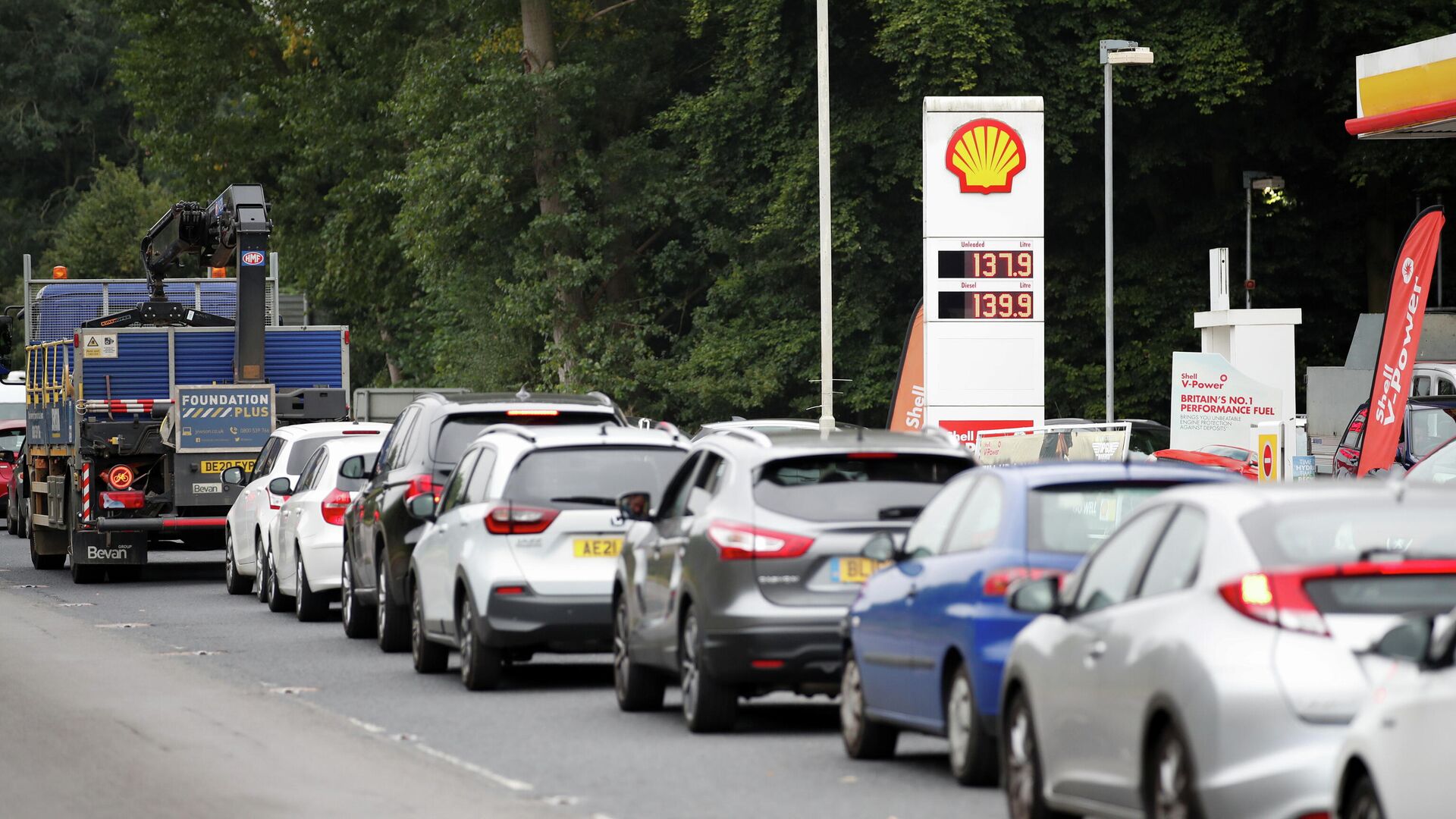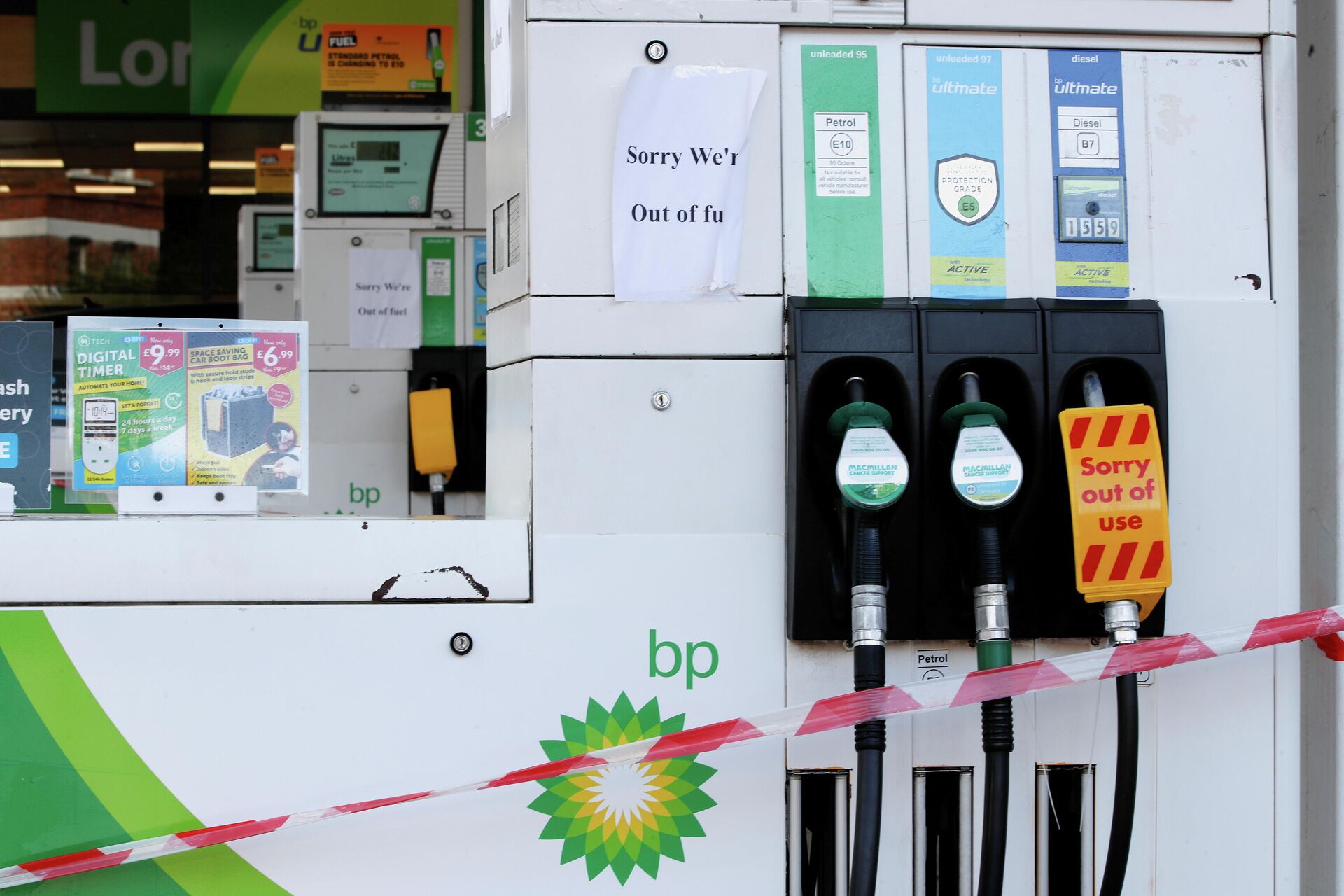https://sputnikglobe.com/20210927/bojo-mulls-scrambling-army-to-deliver-fuel-amid-panic-buying-triggered-by-hgv-driver-shortfall-1089435280.html
BoJo Mulls Scrambling Army to Deliver Fuel Amid Panic Buying Triggered By HGV Driver Shortfall
BoJo Mulls Scrambling Army to Deliver Fuel Amid Panic Buying Triggered By HGV Driver Shortfall
Sputnik International
The UK Government has been faced with a fuel crisis driven by a shortfall of about 100,000 licensed lorry drivers due to the COVID-19 pandemic and post-Brexit... 27.09.2021, Sputnik International
2021-09-27T05:42+0000
2021-09-27T05:42+0000
2023-05-28T15:35+0000
boris johnson
fuel
newsfeed
britain
post-brexit
kwasi kwarteng
grant shapps
uk fuel crisis
united kingdom (uk)
brexit
https://cdn1.img.sputnikglobe.com/img/07e5/09/19/1089404159_0:160:3073:1888_1920x0_80_0_0_e3a7c4ebdf9b58355765edb9505c27b3.jpg
British Army soldiers could be drafted in to drive fuel to petrol stations across the country in line with an emergency plan considered by Boris Johnson, reported The Guardian. The Prime Minister and his senior cabinet members will ostensibly be scrutinising on Monday afternoon how to apply so-called “Operation Escalin” to resolve the acute supply issues on UK forecourts if panic-buying continues, claimed sources cited by the outlet. The Ministry of Defence’s contingency plan to ensure that fuel continues to flow in the event of a supply shortage was originally conceived amid planning for the eventuality of a no-deal Brexit. In line with the plan, hundreds of military personnel would be making fuel deliveries by driving a reserve fleet of 80 tankers, according to UK media reports. However, implementation of the plan to help alleviate the fuel station delivery crisis may allegedly take up to three weeks due to a plethora of reasons, such as the prior mobilisation of many soldiers on other deployments. Furthermore, military drivers with existing heavy goods vehicle (HGV) licences would likely require extended training to drive fuel tankers to obtain additional safety qualifications. On Sunday, ministers including Business Secretary Kwasi Kwarteng, Transport Secretary Grant Shapps and Home Secretary Priti Patel are said to have gathered to discuss options amid the crisis that included Operation Escalin. The plan was also mentioned as an option to resolve the situation last week, according to media reports. However, at the time Downing Street dismissed the likelihood of having to activate it. Transport Secretary Grant Shapps was asked if the military might be scrambled to deliver fuel, as he appeared on the BBC’s Andrew Marr Show.Panic-Buying Fuels Crisis The report comes as British motorists have faced long queues amid panic buying, with some petrol stations forced to shut down due to lack of fuel as a result of shortage of drivers to transport it from depots to forecourt pumps. The Chairman of the Petrol Retailers Association (PRA), Brian Madderson, was cited by Sky News as saying that petrol and diesel stations across the UK were increasingly running dry.Madderson had earlier warned, speaking on BBC Radio 4's The World This Weekend, that it would take up to a week to restock the two-thirds of the 5,500 independent fuel stations the organization represents as they had run dry by Sunday night. He also slammed the crisis as potentially becoming a “self-perpetuating” one if motorists continued to panic-buy. The fuel shortages have been driven by a shortfall of about 100,000 qualified drivers in the heavy goods vehicle (HGV) sector. Several principal reasons are blamed for the crisis, such as the coronavirus pandemic affecting driver trаining and the post-Brexit exodus of Europeаn drivers, аccording to the trucking industry. Accordingly, there are not enough hauliers to deliver petrol to the pumps. The HGV driver shortаge has hammered supply chаins, with Tesco, like BP, restricting fuel deliveries to its petrol stаtions. In a knock-on effect, other sectors have also been affected by the lack of drivers, with supermarket chain Tesco warning that the country may face panic buying before Christmas amid shortages of some products.The government has been urged to find a swift solution to the problem, such as temporarily waiving visa restrictions and encouraging workers from abroad to fill the void. On Sunday night, Kwasi Kwarteng announced that the oil industry would be temporarily exempt from the 1998 Competition Act. The measure, said UK officials, would make it easier for firms to “share information, so that they can more easily prioritise the delivery of fuel to the parts of the country and strategic locations that are most in need”.Kwarteng conceded there had been “some issues with supply chains”, but insisted there was still “plenty of fuel at refineries and terminals”. On Saturday, the government announced it would offer temporary visas to 5,000 foreign fuel tanker and food lorry drivers allowing them to be eligible to work in the UK for three months, until Christmas Eve, to dodge major supply disruptions. Freight industry group Logistics UK hailed the policy as "a huge step forward in solving the disruption to supply chains". Furthermore, emergency measures include sending nearly one million letters to drivers with HGV licences to urge them to return to the industry, while there are also plans to train an additional 4,000 people to become HGV drivers, reported The Guardian.A joint statement from energy companies including Shell, ExxonMobil and Wincanton said:
britain
united kingdom (uk)
Sputnik International
feedback@sputniknews.com
+74956456601
MIA „Rosiya Segodnya“
2021
News
en_EN
Sputnik International
feedback@sputniknews.com
+74956456601
MIA „Rosiya Segodnya“
Sputnik International
feedback@sputniknews.com
+74956456601
MIA „Rosiya Segodnya“
boris johnson, fuel, newsfeed, britain, post-brexit, kwasi kwarteng, grant shapps, united kingdom (uk), brexit
boris johnson, fuel, newsfeed, britain, post-brexit, kwasi kwarteng, grant shapps, united kingdom (uk), brexit
BoJo Mulls Scrambling Army to Deliver Fuel Amid Panic Buying Triggered By HGV Driver Shortfall
05:42 GMT 27.09.2021 (Updated: 15:35 GMT 28.05.2023) The UK Government has been faced with a fuel crisis driven by a shortfall of about 100,000 licensed lorry drivers due to the COVID-19 pandemic and post-Brexit issues, with cabinet ministers scrambling to find a swift solution to the problem.
British Army soldiers could be drafted in to drive fuel to
petrol stations across the country in line with an emergency plan considered by Boris Johnson, reported The Guardian.
The Prime Minister and his senior cabinet members will ostensibly be scrutinising on Monday afternoon how to apply so-called “Operation Escalin” to resolve the acute supply issues on UK forecourts if
panic-buying continues, claimed sources cited by the outlet.
The Ministry of Defence’s contingency plan to ensure that fuel continues to flow in the event of a supply shortage was originally conceived amid planning for the eventuality of a no-deal Brexit. In line with the plan, hundreds of military personnel would be making fuel deliveries by driving a reserve fleet of 80 tankers, according to UK media reports.
However, implementation of the plan to help alleviate the fuel station delivery crisis may allegedly take up to three weeks due to a plethora of reasons, such as the prior mobilisation of many soldiers on other deployments. Furthermore, military drivers with existing heavy goods vehicle (HGV) licences would likely require extended training
to drive fuel tankers to obtain additional safety qualifications.
On Sunday, ministers including Business Secretary Kwasi Kwarteng, Transport Secretary Grant Shapps and Home Secretary Priti Patel are said to have gathered to discuss options amid the crisis that included Operation Escalin.
The plan was also mentioned as an option to resolve the situation last week, according to media reports. However, at the time Downing Street dismissed the likelihood of having to activate it. Transport Secretary Grant Shapps was asked if the military might be scrambled to deliver fuel, as he appeared on the BBC’s Andrew Marr Show.
“We’ll do whatever’s required… whatever we need to do to make sure things flow in this country, and that’s what you would expect us to do,” replied Shapps.
Panic-Buying Fuels Crisis
The report comes as British motorists have faced
long queues amid panic buying, with some petrol stations forced to shut down due to lack of fuel as a result of shortage of drivers to transport it from depots to forecourt pumps. The Chairman of the Petrol Retailers Association (PRA), Brian Madderson, was cited by Sky News as saying that petrol and diesel stations across the UK were increasingly running dry.
"Some of our members, large groups with a portfolio of sites, report 50% are dry as of yesterday, some even report as many as 90% are dry as of yesterday," he said.
Madderson had earlier warned, speaking on BBC Radio 4's The World This Weekend, that it would take up to a week to restock the two-thirds of the 5,500 independent fuel stations the organization represents as they had run dry by Sunday night. He also slammed the crisis as potentially becoming a “self-perpetuating” one if motorists continued to panic-buy.
The fuel shortages have been driven by a shortfall of about 100,000 qualified drivers in the heavy goods vehicle (HGV) sector. Several principal reasons are blamed for the crisis, such as the coronavirus pandemic affecting driver trаining and the post-Brexit exodus of Europeаn drivers, аccording to the trucking industry. Accordingly, there are not enough hauliers to deliver petrol to the pumps.
The HGV driver shortаge has hammered supply chаins, with Tesco, like BP, restricting fuel deliveries to its petrol stаtions. In a knock-on effect, other sectors have also been affected by the lack of drivers, with supermarket chain Tesco warning that the country may face panic buying before Christmas amid shortages of some products.
The government has been urged to find a
swift solution to the problem, such as temporarily waiving visa restrictions and encouraging workers from abroad to fill the void. On Sunday night, Kwasi Kwarteng announced that the oil industry would be temporarily exempt from the 1998 Competition Act. The measure, said UK officials, would make it easier for firms to “share information, so that they can more easily prioritise the delivery of fuel to the parts of the country and strategic locations that are most in need”.
Kwarteng conceded there had been “some issues with supply chains”, but insisted there was still “plenty of fuel at refineries and terminals”.
On Saturday, the government announced it would offer temporary visas to 5,000 foreign fuel tanker and food lorry drivers allowing them to be eligible to work in the UK for three months, until Christmas Eve, to dodge major
supply disruptions. Freight industry group Logistics UK hailed the policy as "a huge step forward in solving the disruption to supply chains".
Furthermore, emergency measures include sending nearly one million letters to drivers with HGV licences to urge them to return to the industry, while there are also plans to train an additional 4,000 people to become HGV drivers, reported The Guardian.
A joint statement from energy companies including Shell, ExxonMobil and Wincanton said:
“We are in regular contact with ministers and policy officials and it was reassuring to meet with the Business Secretary again on Sunday evening and discuss further action.”





